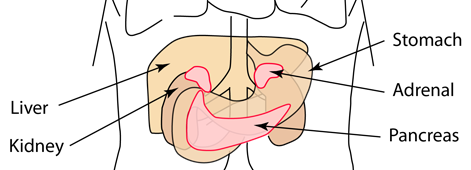Kidney
 | The kidneys help to maintain the fluid balance of the body, help to keep the pH of the body within narrow limits, and are a key part of the handling of toxic nitrogen compounds by filtering and excreting urea from the urea cycle. |
Kidney function is influenced by the endocrine system as it acts to control the fluid balance of the body. The antidiuretic hormone (ADH) synthesized in the hypothalamus and distributed in the bloodstream by the pituitary gland travels to the kidney. It increases the permeability to water of the collecting ducts of the nephrons of the kidney, causing water to be reabsorbed from the urine and retained in the body. This process acts as a negative feedback loop to control the content of water in the blood. The clinical understanding that ADH is inhibited by alcohol helps explain the excessive loss of water in urination after consumption of a large amount of beer.
"When blood pressure falls, the kidneys release renin into the bloodstream. Renin acts as an enzyme, catalyzing the formation of a second hormone, angiotensin, from a protein that circulates in the blood. Angiotensin in turn causes arterioles to constrict, elevating blood pressure. The constriction of the arterioles that carry blood to the kidneys also reduces the rate of blood filtration, causing less water to be removed from the blood. Water retention causes an increase in blood volume and, consequently, an increase in blood pressure."(Audesirk & Audesirk).
In response to low blood oxygen levels, the kidneys release the hormone erythropoietin, which travels in the blood to the bone marrow. There, it stimulates more rapid production of the red blood cells that contain hemoglobin to transport oxygen to the cells.
| More detail on the kidney |
| This material is part of a brief overview of the topics studied in biology with the intent to highlight the connections to basic ideas in physics and physical science. |
Reference
Audesirk & Audesirk
Ch 26, 30
Thibodeau & Patton
Ch 28
| HyperPhysics***** Biology | R Nave |